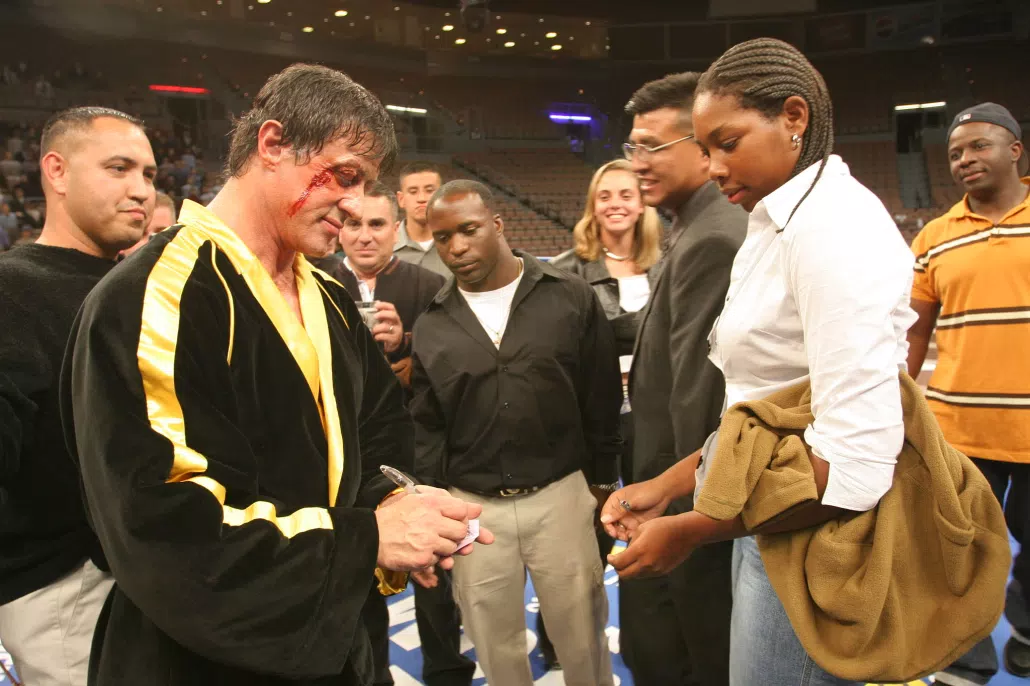THE CULTURAL PLAYBOOK
How sports movies shape our identities
Athletic films are more than just entertainment: They inspire us and mold our understanding of sports.
Athletic films are more than just entertainment: They inspire us and mold our understanding of sports.


When I was 10, my club swim team took a field trip to see “McFarland, USA” (2015) — a movie about a coach who transforms a struggling high school cross country team into champions. My coach was adamant about the entire team watching it together, and for a good reason. The movie conveyed the importance of teamwork, resilience and determination in the face of adversity. I left feeling so motivated and inspired to keep doing my best and showing up with my team.
It is this ability to inspire viewers that makes sports movies so powerful. Through compelling narratives, these films have a way of sparking a sense of passion and determination. Whether it be “McFarland, USA” or “Remember the Titans” (2000), sports films excel at portraying the underdog narrative. They show us that with hard work and dedication, anything is possible. You can’t help but feel inspired after such compelling displays of perseverance.
In my case, my coach wanted us to see the power of teamwork. “McFarland, USA” did a great job at showcasing the importance of unity and the fact that a team can achieve more than the sum of its parts. These are themes that appear over and over again in sports films, but instead of seeming old, they help reinforce those narratives.
Many of these themes have turned into the usual cliches, but you have to love them. They’re what keep us coming back to these films even if we know they are predictable. Who doesn’t love the classic cliches of the “big game” that will determine the protagonist’s ultimate success or failure, the passionate and motivational speech after a critical moment, or the last-second victory when the protagonist suddenly makes a dramatic comeback?
That’s why sports films are so impactful, because as viewers, we truly believe hard work overcomes challenges, or you can start at the bottom and go on to achieve great things. Whether it be Rocky Balboa’s ascent from rags to riches in “Rocky” (1976) or Rudy Ruettiger’s relentless pursuit of his dream to play college football in “Rudy” (1993), these characters embody the human spirit of resilience and perseverance, universal themes that have the power of resonating with anyone, far beyond athletics.
As viewers we’re not only seeing athletes pursue excellence — pushing their limits and chasing their dreams — like in “Chariots of Fire” (1981), where track athletes Harold Abrahams and Eric Liddell work toward winning the 1924 Olympics. We are also being told that we can do the same. The amazing thing about these messages and stories is you don’t have to be an athlete or a sports fan to be inspired. You can take those lessons and apply them to any area of your life.
As these films continue to inspire us, they also continue to leave a significant impact on our culture. Think of the “Rocky” movies that debuted in the 1970s but continue to be prominent in pop culture through iconic scenes like Rocky’s training montage or the many memorable quotes and heartfelt speeches. The “Rocky” series will forever be a timeless classic.
These films play a role in how we view sports and athletes. They provide a lens through which we can explore the themes of teamwork, sacrifice and the pursuit of excellence, helping us better understand some of our favorite athletes and teams. They unite audiences around the world, engaging us with inspiring messages.
Regina Correa is a freshman writing about the realm where sports meet culture in her column, “The Cultural Playbook,” which runs every other Monday.
We are the only independent newspaper here at USC, run at every level by students. That means we aren’t tied down by any other interests but those of readers like you: the students, faculty, staff and South Central residents that together make up the USC community.
Independence is a double-edged sword: We have a unique lens into the University’s actions and policies, and can hold powerful figures accountable when others cannot. But that also means our budget is severely limited. We’re already spread thin as we compensate the writers, photographers, artists, designers and editors whose incredible work you see in our daily paper; as we work to revamp and expand our digital presence, we now have additional staff making podcasts, videos, webpages, our first ever magazine and social media content, who are at risk of being unable to receive the support they deserve.
We are therefore indebted to readers like you, who, by supporting us, help keep our paper daily (we are the only remaining college paper on the West Coast that prints every single weekday), independent, free and widely accessible.
Please consider supporting us. Even $1 goes a long way in supporting our work; if you are able, you can also support us with monthly, or even annual, donations. Thank you.
This site uses cookies. By continuing to browse the site, you are agreeing to our use of cookies.
Accept settingsDo Not AcceptWe may request cookies to be set on your device. We use cookies to let us know when you visit our websites, how you interact with us, to enrich your user experience, and to customize your relationship with our website.
Click on the different category headings to find out more. You can also change some of your preferences. Note that blocking some types of cookies may impact your experience on our websites and the services we are able to offer.
These cookies are strictly necessary to provide you with services available through our website and to use some of its features.
Because these cookies are strictly necessary to deliver the website, refusing them will have impact how our site functions. You always can block or delete cookies by changing your browser settings and force blocking all cookies on this website. But this will always prompt you to accept/refuse cookies when revisiting our site.
We fully respect if you want to refuse cookies but to avoid asking you again and again kindly allow us to store a cookie for that. You are free to opt out any time or opt in for other cookies to get a better experience. If you refuse cookies we will remove all set cookies in our domain.
We provide you with a list of stored cookies on your computer in our domain so you can check what we stored. Due to security reasons we are not able to show or modify cookies from other domains. You can check these in your browser security settings.
These cookies collect information that is used either in aggregate form to help us understand how our website is being used or how effective our marketing campaigns are, or to help us customize our website and application for you in order to enhance your experience.
If you do not want that we track your visit to our site you can disable tracking in your browser here:
We also use different external services like Google Webfonts, Google Maps, and external Video providers. Since these providers may collect personal data like your IP address we allow you to block them here. Please be aware that this might heavily reduce the functionality and appearance of our site. Changes will take effect once you reload the page.
Google Webfont Settings:
Google Map Settings:
Google reCaptcha Settings:
Vimeo and Youtube video embeds:
The following cookies are also needed - You can choose if you want to allow them:
